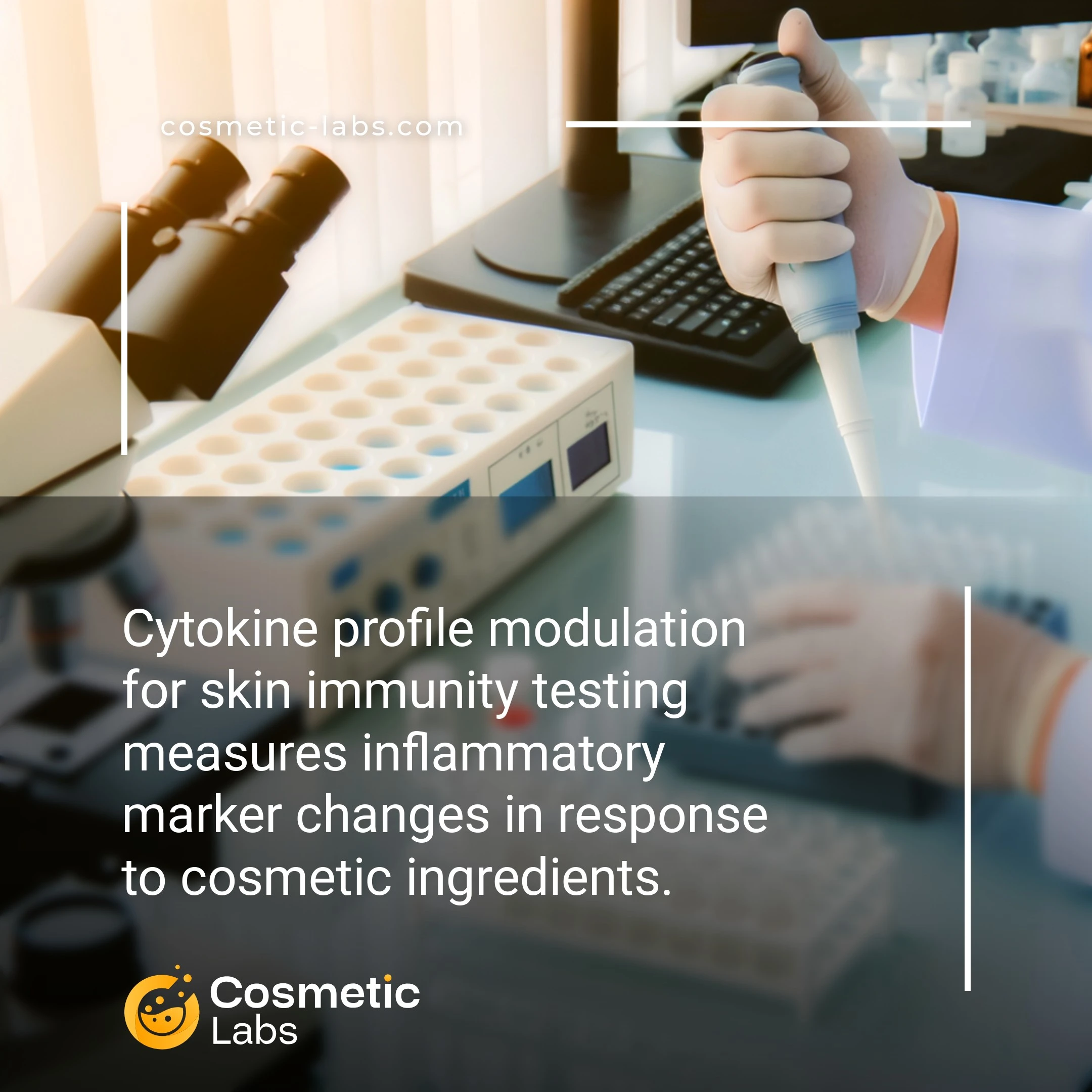Cytokine Testing Services for Skin Immunity Product Claims

What is Cytokine profile modulation?
Cytokine profile modulation testing measures how cosmetic ingredients influence the skin’s immune response by analyzing specific inflammatory markers like interleukin-1β and tumor necrosis factor-alpha. Labs use ex vivo skin models and cell cultures to evaluate whether your formulations trigger unwanted immune reactions or enhance protective barrier functions. This preclinical assessment helps brands identify potential irritants early and optimize ingredient concentrations before human trials, reducing development costs and regulatory risks.
Why do you need this service?
Cosmetic labs use cytokine profile analysis to validate anti-inflammatory claims for sensitive skin products and demonstrate how active ingredients like niacinamide or ceramides reduce inflammatory markers IL-1β and TNF-α. This testing helps brands substantiate marketing claims with quantifiable immune response data, supporting regulatory submissions and consumer confidence in products targeting rosacea, eczema, or reactive skin conditions.
Who provides Cytokine profile modulation services?
All cosmetic labs providing Cytokine profile modulation services
There is no company providing these services at the moment.
Cytokine Profile Modulation Testing for Skin Immunity
Cytokine analysis reveals how cosmetic ingredients influence skin’s immune response pathways. Labs measure specific inflammatory markers and immune mediators to validate product claims about skin barrier protection and anti-inflammatory benefits.
Inflammatory Marker Assessment
Testing protocols examine cytokine expression patterns in response to ingredient exposure. Labs analyze key inflammatory mediators including IL-1β, TNF-α, and IL-6 levels using cell culture models and tissue samples. This data shows whether formulations trigger or suppress inflammatory cascades.
Standard assays include:
- Pro-inflammatory cytokine quantification
- Anti-inflammatory mediator measurement
- Immune cell activation profiling
- Barrier function correlation studies
Results help brands substantiate anti-inflammatory claims with measurable biomarker data.
Immune Response Modulation Studies
Labs test how ingredients affect skin’s adaptive immune responses through controlled exposure protocols. Testing measures changes in immune cell behavior, cytokine production ratios, and inflammatory resolution pathways. This approach validates products designed for sensitive skin or barrier repair.
Key measurements include:
- T-cell activation markers
- Regulatory cytokine balance
- Skin barrier recovery rates
- Allergen response modulation
Data supports regulatory submissions and marketing claims about immune-supportive formulations. Connect with specialized labs on our platform to discuss cytokine testing requirements for your product development needs.
Practical Applications of Cytokine Profile Modulation Testing for Skin Immunity
Brand owners rely on cytokine profile modulation testing to validate skin immunity claims and optimize formulations for sensitive skin conditions.
Anti-Inflammatory Product Development
Labs measure inflammatory cytokines like IL-1β, TNF-α, and IL-6 to assess how ingredients reduce skin irritation. Testing protocols expose cultured keratinocytes to known irritants, then apply test formulations to measure cytokine reduction over 24-48 hours.
This data supports claims for sensitive skin formulations and helps brands identify optimal concentrations for anti-inflammatory actives. Results typically show 20-60% cytokine reduction compared to untreated controls, providing quantifiable evidence for regulatory submissions.
Barrier Function Enhancement Validation
Testing services evaluate how products influence barrier-supporting cytokines including IL-10 and TGF-β. Labs use reconstructed skin models to simulate compromised barrier conditions, then measure cytokine modulation after ingredient application.
Brands use this data to substantiate repair claims for damaged skin products. Barrier restoration testing typically demonstrates 30-80% improvement in protective cytokine expression within 72 hours, supporting marketing claims for compromised skin formulations.
| Cytokine Marker | Function | Target Change | Typical Timeline |
|---|---|---|---|
| IL-1β | Inflammatory response | Decrease 40-70% | 24-48 hours |
| TNF-α | Tissue inflammation | Decrease 30-60% | 24-72 hours |
| IL-10 | Anti-inflammatory | Increase 25-50% | 48-96 hours |
| TGF-β | Tissue repair | Increase 20-40% | 72-120 hours |
Connect with specialized labs on our platform to access cytokine profiling services that support your product development and regulatory requirements.
